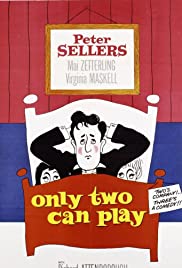Edith Karlmar’s The Wayward Girl is at its finest in
observing the protagonist of the title, Gerd, marvelously embodied by an uninhibited
Liv Ullmann in one of her earliest roles – she’s not yet eighteen but already in
possession of a “bad” reputation, and the director and actress are completely
attuned to the tumbling mixture of boredom and glee that drives her actions,
her fascination with her own sexuality, and with the legacy of her bumpy
personal history (she never knew her father; her mother is often away and equally
poorly regarded). A boy from a more stable background, Anders, falls for her
and steals his father’s car to take her to a remote tumbledown farm, with some
undefined plan of shaking off the bad element she runs with and of opening up
something lasting; the parents soon discover their location, but let it ride
for a while, and then the situation becomes more complex with the arrival of Bendik,
a vagrant with a much more openly lascivious response to Gerd’s provocations. One
of the film’s most startling scenes has Bendik pausing from cooking a game bird
he’s killed, and imitating its mating behaviour for the amusement and
provocation of Gerd and her mother – their shared reaction provides the film’s
most marked moment of commonality between the two, brought together in mutual transgressive
delight. The final scenes aren’t among the film’s strongest though, the
imperative of wrapping up the plot coming at the cost of pushing Gerd relatively
to the side of the narrative, emphasizing instead the conflict between the younger
and older man. But, of course, that makes its own kind of point too, that the
window for Gerd’s “waywardness” to evade lasting social and biological consequences
was always a narrow one, and that any sense of positive closure was always
likely to be fragile, if not completely hollow.





